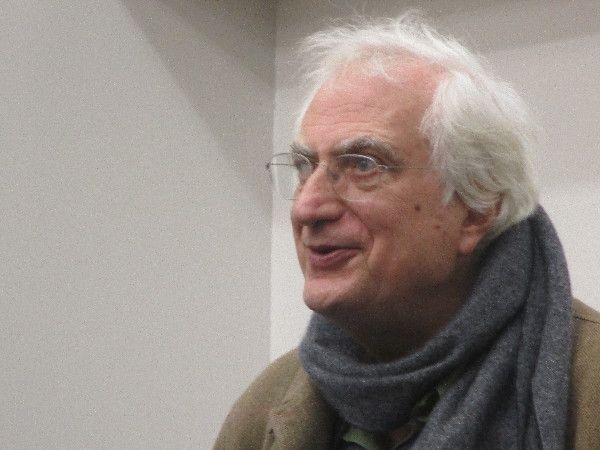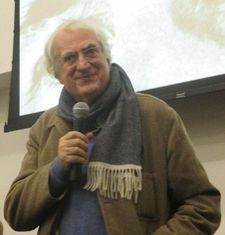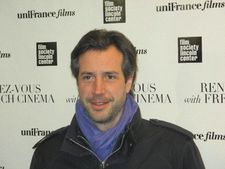 |
| Niels Arestrup to Bertrand Tavernier on Claude Maupas in Quai D'Orsay: "You ask me to play a very introverted, soft spoken guy and I am the opposite." Photo: Anne-Katrin Titze |
Bertrand Tavernier's The French Minister (Quai D’Orsay) starring Thierry Lhermitte, Raphaël Personnaz, Niels Arestrup and Anaïs Demoustier, with Jane Birkin impersonating a version of Toni Morrison and Julie Gayet as a potent advisor, is the closing night film of New York's Rendez-Vous with French Cinema.
We discussed the importance of rhythm for his film, how Billy Wilder and Jacques Becker set a mood, the working relationship with writers Christophe Blain and Cultural Counselor to the French Embassy Antonin Baudry, Arestrup's dedication, and the decision to not watch films when making one. Tavernier also gave me insight into how he created the unequaled complexity of character with Philippe Noiret and Isabelle Huppert in Coup De Torchon.
"A fool who must orate is frozen with fear," said Heraclitus. Quotes from the Greek philosopher mark the chapters of Tavernier's wonderfully absurd look at French politics. Foreign Minister Alexandre Taillard de Worms, played by Thierry Lhermitte, repeats himself endlessly, loves neon yellow markers and active verbs. The Minister loves literature and knows all about it. Arthur (Raphaël Personnaz) is newly hired for the most important job and the always intense Niels Arestrup is the heart of the ministry, funnier than he has ever been on screen. Julie Gayet plays an advisor with dimensions. The French Minister balances the tricky realm of parody with poise.
Anne-Katrin Titze: Can you talk about the Heraclitus quotes? Were they structuring the film from its inception?
 |
| Bertrand Tavernier on Anaïs Demoustier and Raphaël Personnaz: "They had a tremendous interaction and I was able to improvise many moments with them." Photo: Anne-Katrin Titze |
Bertrand Tavernier: Yes, immediately. When I came to Antonin [Baudry], I said there were several things which I wanted to keep. I wanted to keep the quotes from Heraclitus, although we changed some of them.
The film is based on Antonin Baudry’s graphic novels about his time working in the Foreign Ministry under Dominique de Villepin.
AKT: What changes were made from the graphic novel to the screen?
BT: I wanted to change the character of the girlfriend of Arthur and make her totally different from the graphic novel. And I wanted to end with the speech at the UN, which was not in the book I had. But the quotes of Heraclitus, I always was for that. We changed the order and we added some more… The speech is one of the most beautiful, strong speeches in French politics of the last three or four decades. Out of the chaos, with a minister who increases the chaos, comes that speech. There had never been anything as strong in the French foreign policy after that. When you have that in mind, it was easy to avoid being cynical, which I would hate to be. And especially not patronising. I love the characters. I have tremendous respect for the character played by Niels Arestrup. He works 18 hours a day, he is for me the symbol of the civil servant.
AKT: Niels Arestrup is fantastic in your film. I especially like the scene in which he pretends to have fallen asleep watching TV at night at his desk and snaps back into work in an instant.
BT: He was really asleep! He is famous for that… I called him and I talked to him about the part. He said, "well, you are asking me to do the opposite of what I do since the last 40 years and the opposite of my nature. You ask me to play a very introverted, soft spoken guy and I am the opposite. It will be very different but it is a challenge." He asked for some specific things. To be always alone, not having lunch with everybody because he said, "I need to keep my concentration. For me it's very, very difficult to keep that music, that tone." He was marvelous, marvelous! A joy to work with. Recently on French TV he said; "Bertrand Tavernier was the only one who had the courage to think that I could make people laugh. Nobody did that for 40 years."
AKT: You said you changed the role of the girlfriend (Marina played by Anaïs Demoustier) completely. Why did you make that decision?
BT: Because I wanted her to be the equal of Arthur. I think in the book she is more complaining. I wanted her to have a job. I immediately proposed that she was a school teacher. When we were working with Antonin and Christophe [Blain] that led to the story of the people who had no papers and introduced something. A link between what she was doing and Arthur's job. I wanted her to be funny, sometimes making fun of Arthur. And doubting, which was a good way for the audience to play. At the same time I really wanted to show two people loving each other. And I think Anaïs and Raphaël [Personnaz] were wonderful. You know, there is nothing more difficult for a film director than to create the idea of a couple. You must really impose the idea that two people are living together. It's very easy when you see people meeting and falling in love. But they are living together. And Anaïs and Raphaël gave me that in 45 seconds. I have the feeling they have been living together for several years, they know each other, they make fun of each other. They had a tremendous interaction and I was able to improvise many moments with them.
 |
| The French Minister (Quai d'Orsay) based on Antonin Baudry's graphic novels: "When I came to Antonin, I said there were several things which I wanted to keep." Photo: Anne-Katrin Titze |
"I tell them not to play it as comedy and it will be funny," Tavernier told me when we spoke the week before.
BT: Even though I'm a film buff, when I start making a film, I do not see films anymore. I was thinking, as a matter of rhythm, of some of the comedies of Billy Wilder or Jacques Becker. People who were doing films with some great tempo and making very, very funny things out of moments which could be very dramatic. Another good example is His Girl Friday (1940). I was trying to get my mind to have the same energy, the same rhythm of the direction.
At a screening at Hunter College of Tavernier's masterpiece from 1981 Coup De Torchon, which was introduced by Lynn A. Higgins, author of Bertrand Tavernier (Manchester University Press, 2011), I asked the director about his unfathomably mysterious characters.
AKT: Watching Coup De Torchon again, I was thinking about how it connects to your latest film. It does in the endlessly faceted, constantly surprising characters. When do you stop developing a character?
BT: Never! During writing and even on the set with the actors I add a line, I add something, a detail which makes the character a bit more interesting. A new angle, a new colour. Even after that in the editing, I am always trying to improve to get that sense of complexity. In that case it was being faithful to Jim Thompson [who wrote the novel Pop.1280 that inspired Coup De Torchon]. He has a way of getting under your skin and never leaves you any easy way out. The opposite of an American film. In an American film, everything must be resolved. If you want to be faithful, you cannot resolve, you cannot give one explanation. I said to Philippe Noiret, in this film I want you to play each scene without thinking of the scene before or the scene after. I never want to know if you are planning the things that are happening. When we saw the cut, we knew it worked. On this film I tried to experiment with many things, like filming entirely on Steadicam. Because the Steadicam was giving me the equivalent of the moral ambiguity. In the novel you are never safe and with a Steadicam, there is a strange feeling that things are not stable.





















